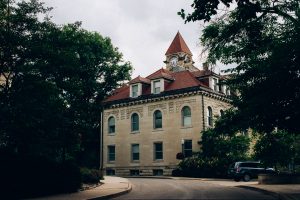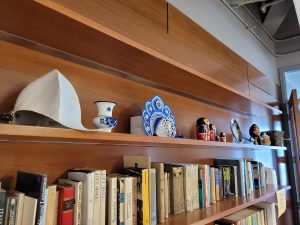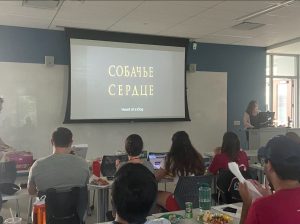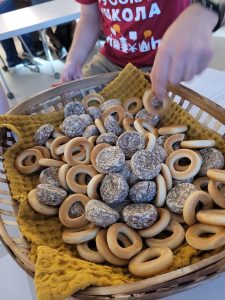
This past summer, I participated in the Language Workshop offered by the University of Indiana in Bloomington. At first, I was unsure as to what to expect, considering I had never met anyone at UNC that had participated in the program. Upon arrival, I learned that the intensive Russian language course was the first to be offered as a summer program, and has historically offered routes towards success in language acquisition to countless students of many backgrounds. With decades of experience backing the program and many other languages applying different pedagogical techniques, I felt reassured that I had chosen the right program. The Russian language program is perhaps the most extensive, with six immersion levels, and an online seventh level dedicated to heritage speakers. The immersion was perhaps the most intense aspect, as I was required to sign a document committing to communicate only in Russian with the rest of the cohort, instructors, and program organizers. Of course, I was allowed to speak in English if I went to the store, or if I needed to communicate with IU staff, but after a few weeks, it felt almost weird to do so. The challenge of upholding the immersion contract was in realizing that I lacked the vocabulary to ask a friend for a can opener, or explain to someone the requirements and process of getting a student ID.

Luckily, aside from the regular coursework and the extra tutoring sessions (referred to as skills training as it served more as a designated time to develop individual language skills according to the needs of each student), the workshop offered daily activities and club meetings focused on different aspects of the language and Russian culture. My favorite activities were held on Thursdays and Fridays; they offered a film club and a cartoon club on Thursday, and a cooking club on Friday (where I could finally learn how to ask for a can opener). Other clubs, for example, focused on translating documents, analyzing journalistic media, debating, and other aspects related to the language. Perhaps the most fascinating part was that every language offered at the workshop had clubs of their own, and, although all were offered entirely in the target language, anyone was welcome to join.

It was this degree of thoughtfulness and attention to detail that I appreciated the most, and I am unsure I would have encountered this elsewhere. For example, my instructors were very critical of my language usage, and they always listened to all of our conversation exercises and took notes in real time of the mistakes made. They would use these notes to check if it was a mistake made by accident in spontaneous speech or if there was a misunderstanding of grammar that needed to be addressed. At first, I found it overwhelming to consistently be corrected, but later the corrections were less and less frequent, as I became more careful to avoid the bad habits I had developed previously.

In terms of the social aspect, the Russian program had the most students enrolled from all parts of the country, So, it was incredibly easy to meet new people to practice Russian and become friends with. Bloomington is a rather small city with incredibly walkable areas, so it was fun to engage in my own hobbies with similarly minded people. I even got to meet people from other universities part of the Flagship Program, and some are even slated to take their capstone year at the same time as me. So, I am incredibly excited to get to see them again in the future.

Overall, I had an overwhelmingly positive experience, and I would highly recommend the workshop to anyone entering RUSS 409 or to anyone having completed RUSS 410. My impression was that this threshold between an intermediate level language course into an advanced one is the most difficult bridge to cross, and IU has designed courses that uniquely address the needs of each student at this level.
Miguel Angel Bahena Schott is a senior with a double-major in Physics and Russian.
